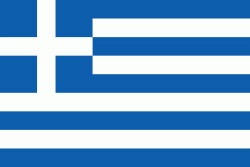Cephalonia International Airport (Cephalonia International Airport)
Kefalonia Airport "Anna Pollatou" is an airport on the island of Kefalonia, in Greece. It is located in the southwest of the island, 8 km away from the capital Argostoli.
The airport opened in 1971 to serve the former municipality Leivathos with improved transportation links; Kefalonia is now a single municipality. A new runway and the current terminal building were constructed in the 1980s.
In December 2015, the privatization of Kefalonia Airport and 13 other regional airports of Greece was finalized with the signing of the agreement between the Fraport AG/Copelouzos Group joint venture and the state privatisation fund. "We signed the deal today," the head of Greece's privatisation agency HRADF, Stergios Pitsiorlas, told Reuters. According to the agreement, the joint venture will operate the 14 airports (including Kefallinia International Airport) for 40 years as of April 2017.
The new operator completed a major upgrade of the airport's facilities, including constructing a new terminal building that replaced the outdated existing one. Upgrades included new check-in desks and security lanes, larger airside space with more shops, new carousels for arrivals and extra car-hire companies. Work has also been completed on the car park and pick-up/drop-off points outside the terminal building. Due to the COVID-19 pandemic, many flights to the airport were suspended for 2020, although flights from Europe are gradually restarting.
The airport opened in 1971 to serve the former municipality Leivathos with improved transportation links; Kefalonia is now a single municipality. A new runway and the current terminal building were constructed in the 1980s.
In December 2015, the privatization of Kefalonia Airport and 13 other regional airports of Greece was finalized with the signing of the agreement between the Fraport AG/Copelouzos Group joint venture and the state privatisation fund. "We signed the deal today," the head of Greece's privatisation agency HRADF, Stergios Pitsiorlas, told Reuters. According to the agreement, the joint venture will operate the 14 airports (including Kefallinia International Airport) for 40 years as of April 2017.
The new operator completed a major upgrade of the airport's facilities, including constructing a new terminal building that replaced the outdated existing one. Upgrades included new check-in desks and security lanes, larger airside space with more shops, new carousels for arrivals and extra car-hire companies. Work has also been completed on the car park and pick-up/drop-off points outside the terminal building. Due to the COVID-19 pandemic, many flights to the airport were suspended for 2020, although flights from Europe are gradually restarting.
| IATA Code | EFL | ICAO Code | LGKF | FAA Code | |
|---|---|---|---|---|---|
| Telephone | Fax | ||||
| Home page | Hyperlink |
Map - Cephalonia International Airport (Cephalonia International Airport)
Map
Country - Greece
 |
 |
| Flag of Greece | |
Greece is considered the cradle of Western civilization, being the birthplace of democracy, Western philosophy, Western literature, historiography, political science, major scientific and mathematical principles, theatre and the Olympic Games. From the eighth century BC, the Greeks were organised into various independent city-states, known as poleis (singular polis), which spanned the Mediterranean and the Black Sea. Philip II of Macedon united most of present-day Greece in the fourth century BC, with his son Alexander the Great rapidly conquering much of the ancient world, from the eastern Mediterranean to the North Western parts of India. The subsequent Hellenistic period saw the height of Greek culture and influence in antiquity. Greece was annexed by Rome in the second century BC, becoming an integral part of the Roman Empire and its continuation, the Byzantine Empire, which was culturally and linguistically predominantly Greek.
Currency / Language
| ISO | Currency | Symbol | Significant figures |
|---|---|---|---|
| EUR | Euro | € | 2 |
| ISO | Language |
|---|---|
| EN | English language |
| FR | French language |
| EL | Greek language |















